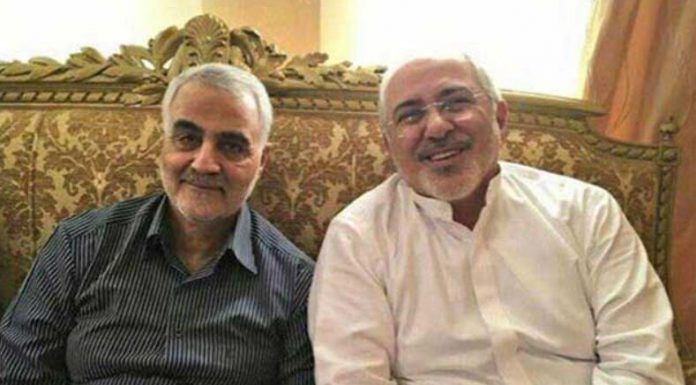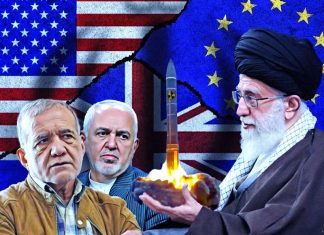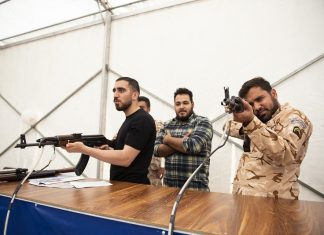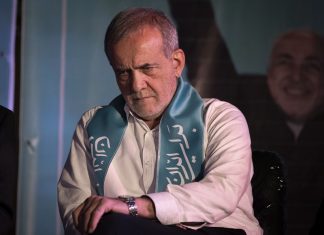According to some Iranian officials and Western diplomats, parties involved in the Vienna talks are close to reaching a “nuclear deal.”
Officially, some warn that “many issues remain unresolved,” others, including Russian Foreign Minister Sergei Lavrov, note that “an agreement still is a long way off.”
U.S. Secretary of State Antony Blinken and President Joe Biden’s negotiating team in the Vienna talks have repeatedly said that “no agreement can be reached until everyone agrees on everything.”
By everything, the U.S. means that the negotiations should include Iran’s ballistic missile program and its support for Shia militias in the region and the Axis of Resistance.
The Axis of Resistance is an anti-Israel, anti-Saudi, and anti-Western informal military alliance between Iran, the Syrian Assad government, and Lebanese Hezbollah.
However, Iran’s Supreme Leader Ayatollah Ali Khamenei has repeatedly said that those three issues are “sacred to the revolution” and therefore not open to negotiations.
Former Iranian Deputy Foreign Minister Abbas Araghchi, who served in President Hassan Rouhani’s government, led the Iranian delegation during six rounds of nuclear talks in Vienna with the negotiating teams from Britain, France, China, Russia, and Germany — the original signatories to the 2015 Joint Comprehensive Plan of Action (JCPOA), the Iran nuclear deal, which also included the U.S.
Although the U.S. withdrew from the agreement in May 2018, it has taken part, indirectly, in the Vienna talks to revive the nuclear deal.
Mr. Araghchi is a former member of the Islamic Revolutionary Guard Corps (IRGC) Qods Force, responsible for extraterritorial military and intelligence operations.
Former President Hassan Rouhani, his Foreign Minister Javad Zarif and many senior officials, including reformist politicians who are staunch supporters of the state, have urged Mr. Khamenei to include Iran’s ballistic missile program and its support for the militia groups in the region in the talks. They argue that discussing these issues could help Iran strike a deal with the U.S.
Khamenei Criticises Iran’s Foreign Minister over Leaked Remarks
During his last days in office, Mr. Rouhani argued that if Araghchi had been given the authority, he would have successfully negotiated the lifting of all sanctions in Vienna. Rouhani wanted Araghchi to be given the green light to include Iran’s missile program and regional activities in the discussions.
However, senior Iranian officials and military commanders have consistently argued that those issues are “sacred to the revolution” and are off limits.
In comments reported by the Entekhab news agency in January 2021, Brigadier General Amir Ali Hajizadeh, the commander of the IRGC’s Aerospace Force, warned that the “missile capabilities were the country’s red line and not open for discussion,” adding that “no one had the right to negotiate these issues.”
The IRGC has reportedly tested its long-range cruise missiles and launched a new wave of threats against Israel each time the subject of Iran’s missile program and regional activities came up during the Vienna talks.
Iran Commander Says Tehran Will Continue Advancing Its Missile Program – Tasnim
Also, whenever the Western delegates at the Vienna talks have pressed Iran on its missile program and regional ambitions, Shia militias, operating under IRGC’s auspices in the region, have attacked U.S. interests or oil companies or mined the commercial shipping corridors in the Persian Gulf.
According to former President Hassan Rouhani, the IRGC has done everything in its power to undermine the JCPOA since it was signed in 2015.
One of the staunch opponents of the JCPOA was the former commander of the IRGC, the late Lieutenant General Ghasem Soleimani, who described it as a “three-sided” deal that included Iran’s nuclear, missile, and regional activities.
“The JCPOA 2 and 3 aim to halt the spread of pure Islam in the region,” General Soleimani famously said.
Lieutenant General Ghasem Soleimani was killed during a U.S. drone attack on the Baghdad International Airport on Jan. 3, 2020.
During his confirmation hearing in the Majlis (Iranian Parliament), the current Iranian Foreign Minister Seyyed Amir Abdollahian promised to continue the negotiations on lifting economic sanctions while “doing his utmost to cooperate with the Axis of Resistance and strengthen its presence in the region.”
Abdollahian believed that IRGC’s military operations had strengthened the Iranian side in the nuclear talks. He blatantly admitted that the IRGC’s missile and regional threats were the Islamic Republic’s principal foreign policy tools. His support for the Shia militias gained Mr. Abdollahian the nicknames “Haj Ghasem of Diplomacy” and “Resistance Diplomat.”
However, former Iranian Foreign Minister Mohammad Javad Zarif argued that “military strength alone could not ensure security” and that diplomacy should not be abandoned in favor of “field operations.”
Mr. Zarif resigned after not being included in a high-level meeting with the Syrian President Bashar al-Assad, which General Soleimani attended. Soleimani persuaded Zarif to withdraw his resignation.
[aesop_image img=”https://kayhanlife.com/wp-content/uploads/2019/02/2019-02-25T175951Z_96123046_RC136785FC30_RTRMADP_3_MIDEAST-CRISIS-SYRIA-ASSAD.jpg” panorama=”off” credit=”REUTERS./” align=”center” lightbox=”on” captionsrc=”custom” caption=”FILE PHOTO: Syria’s President Bashar al-Assad shakes hands with Iranian Supreme Leader Ayatollah Ali Khamenei in Tehran, Iran. ” captionposition=”left” revealfx=”off” overlay_revealfx=”off”]
IRGC’s senior commanders welcomed the appointment of Foreign Minister Abdollahian.
The commander of the Qods Force, Brigadier Esmail Ghaani, went to the foreign ministry to congratulate Abdollahian in person. During their meeting, Abdollahian assured General Ghaani that “the foreign ministry would follow the same path as Soleimani.”
The eighth round of Vienna talks started on Nov. 29, 2021. Once a staunch opponent of the deal, Deputy Foreign Minister Ali Bagheri Kani, led the Iranian delegation on talks to revive the nuclear deal.
Those in Iran who have always opposed the JCPOA were angry after the so-called “resistance diplomats” in the Vienna talks agreed, unconditionally, to allow the UN nuclear watchdog, the International Atomic Energy Agency (IAEA), to install cameras at TESA Karaj Complex, a nuclear facility 24 miles northwest of Tehran.
The critics of the 2015 nuclear deal are concerned that Foreign Minister Abdollahian and President Raisi, and Rear Admiral Ali Shamkhani, the Secretary of the Supreme National Security Council, are all in favor of talking to the U.S. directly.
It seems the “revolutionary government” whose campaign slogan was to “avenge Ghasem Soleimani and Fakhrizadeh” and support the “Axis of Resistance” has, after two rounds of talks, come to the same conclusion that Rouhani’s government and his negotiating team headed by Abbas Araghchi reached, namely include Iran’s missile program and regional activities in discussions.
On Nov. 27, unknown attackers killed Mohsen Fakhrizadeh, dubbed the “father of Iran’s nuclear program,” reportedly using a “remote control weapon” to fire on his car in Absard, 80 kilometers east of Tehran.
While Admiral Shamkhani walked back from his comments on the need for direct talks with the U.S. after receiving criticisms, Mr. Raisi and Abdollahian have not changed their position on the issue.
Many reformists who opposed the IRGC and President Raisi and his hardline views are now supporting him in his efforts to start direct talks with the U.S.
A powerful faction within the IRGC finds the current situation intolerable. Observers believe the test firing of 16 Ballistic missiles during the “Great Profit” military exercises on Jan. 6 and the launch of Iranian satellite, Simorgh rocket (Safir-2), which failed to reach its intended orbit, was part of a broader campaign by the IRGC to undermine any negotiations on Iran’s missile program and regional activities.
Other measures aimed at weakening support for directs talks with the U.S. included the unveiling of the “Haj Ghasem” ballistic missile in August 2020 and “Khaybar Shekan” missile (using solid fuel) earlier this month, increased rocket and drone attacks on the U.S. interests in Syria and Iraq by militias operating under IRGC’s auspices, and continued rocket and drone attacks on Dubai and Abu Dhabi by Yemen’s Houthi rebels.
As the Vienna talks get closer to producing an agreement, it is unclear what concessions the Islamic Republic is ready to make regarding its missile program and regional activities.
Meanwhile, the infighting over the missile program and regional activities has reportedly intensified among various factions inside the Iranian regime, especially within the IRGC.
During a speech on Feb. 13 to a gathering of IRGC rank and file in Semnan, capital of the northern province of Semnan, the former commander of the IRGC Ground Forces, Brigadier General Mohammad Jafar Asadi, said: “We will continue on the righteous path irrespective of politicians making any progress or not. We are not worried about the outcome of the talks, and neither are the followers of Velayat-e Faqih [guardianship of the Islamic jurist].”
“As martyred general Ghasem Soleimani said, we are the children of Ashura,” General Asadi added. “Our religion, dignity, and honor are non-negotiable.”
Speaking to reporters on Feb. 19, the White House Press Secretary, Jen Psaki, said that the “Vienna talks will produce real results.”
Three days earlier, Admiral Shamkhani tweeted: “We will not hold extra-JCPOA talks with the unreliable Americans and ineffective Europeans.”
The comments by all sides show that the Vienna talks most likely include Iran’s missile program and regional activities — topics that Mr. Khamenei has repeatedly said are “sacred to the revolution” and are non-negotiable.
The Islamic Republic and Mr. Khamenei have only two options. They could give in and strike a deal, or accept the domestic and international consequences of the sanctions and even move towards a military conflict.
It is unclear what role Khamenei plays in the current situation. Can he persuade the IRGC and economic cartels operating under its auspices to accept another deal?
Khamenei may be ready for another and yet more painful “heroic flexibility” if he believes he can wield enough power among the regime’s supporters inside Iran to achieve his goal. However, the prevailing political climate may dictate his decision if his powers have diminished, and he comes under domestic and international pressure.
In an interview with the Iranian state TV in 2019, Ali Akbar Velayati, a senior advisor to Khamenei on foreign policy matters, noted that “the nuclear agreement was a state affair and not an individual decision.” Mr. Velayati admitted that “failure to have signed the agreement in 2015 would have led to war.”
Former U.S. President Donald Trump cited Iran’s violation of the JCPOA articles as the reason for its country’s unilateral withdrawal from the treaty in May 2018.
Mr. Trump and his government argued that Iran had spent millions of dollars it had received from former President Barack Obama’s government, after the signing of the JCPOA in 2015, on its secret nuclear and missile programs and terrorist activities.





